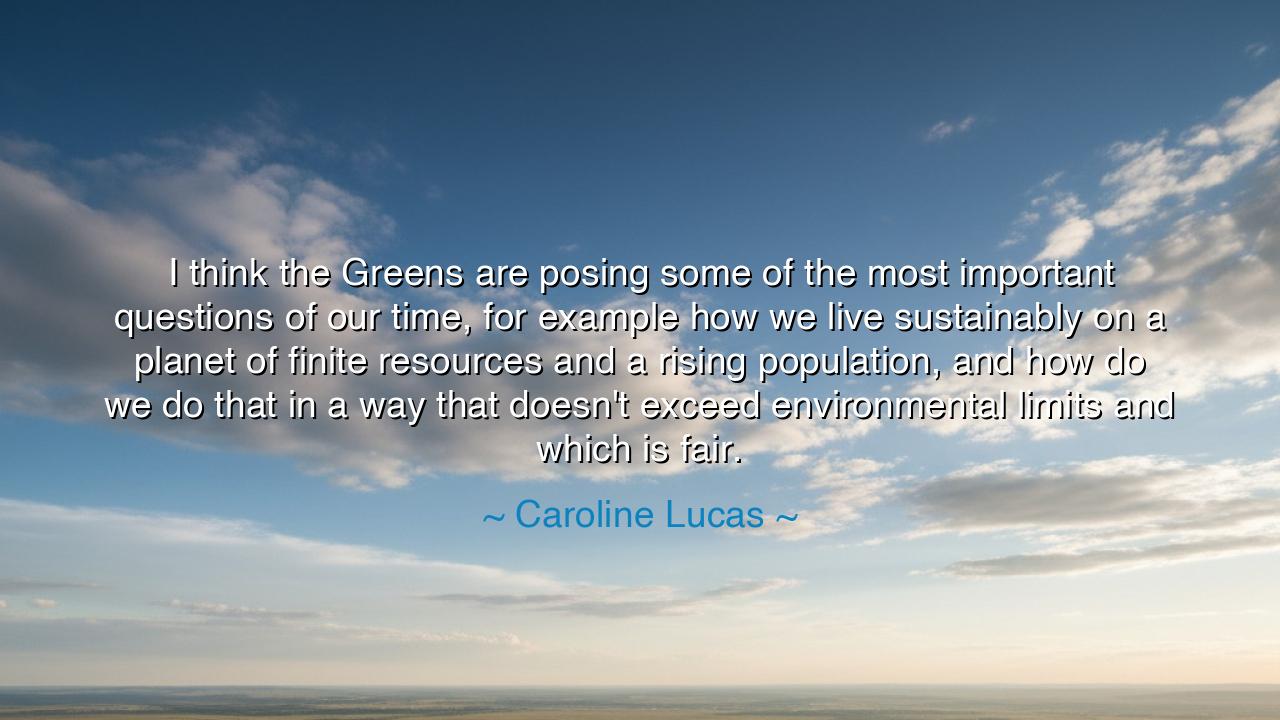
I think the Greens are posing some of the most important
I think the Greens are posing some of the most important questions of our time, for example how we live sustainably on a planet of finite resources and a rising population, and how do we do that in a way that doesn't exceed environmental limits and which is fair.






Hear the voice of Caroline Lucas, a guardian of the earth and a herald of conscience, who declared: “I think the Greens are posing some of the most important questions of our time, for example how we live sustainably on a planet of finite resources and a rising population, and how do we do that in a way that doesn't exceed environmental limits and which is fair.” In these words lies not merely political debate, but a cry of urgency, a teaching for the ages. She points us toward the dilemma that stands before every generation: how to live well upon the earth without destroying it, and how to share its blessings without injustice.
She speaks first of finite resources, a truth as old as humanity but often forgotten. The earth, though vast, is not endless. Its forests, waters, soils, and minerals are gifts, but they are not infinite treasures to be squandered. Lucas reminds us that to live as though they are inexhaustible is folly, for it leads not to prosperity but to ruin. The ancients knew this: farmers rotated crops, shepherds rested their pastures, communities revered sacred groves. Yet in the fever of modern consumption, men plunder as if there were no tomorrow. Her words call us back to wisdom.
Then she speaks of a rising population, and here the challenge deepens. For as more mouths cry for food, more bodies need shelter, and more minds seek work, the demand upon the earth multiplies. History warns us of what happens when growth meets neglect. In Easter Island, too many hands felled too many trees, until the land lay barren, and society collapsed in hunger and conflict. Lucas asks us to confront this truth with honesty: how shall billions live without pressing the earth beyond its environmental limits? This is not a question of convenience, but of survival.
Yet she does not speak only of limits; she speaks also of fairness. For what is the use of sustainability if it is borne only by the poor, while the rich feast and waste? True justice requires that the burdens of restraint and the fruits of protection be shared equitably. Recall the parable of the commons: when each herdsman took without care, the pasture was destroyed. But when they agreed to share and restrain, the pasture flourished for all. So too in our age, fairness is not luxury but necessity, for without it, anger and division will tear apart even the wisest plans.
The emotional heart of Lucas’s words is the insistence that the questions themselves are sacred. She does not claim to have every answer, but she proclaims the duty to ask: How do we live? How do we share? How do we endure without destroying what sustains us? To ignore these questions is to walk blindly toward the abyss. To wrestle with them, however hard, is to honor both our ancestors and our descendants.
The lesson, O listener, is this: never grow weary of asking hard questions about the way you live. Do not be lulled by comfort or blinded by wealth into thinking the earth’s bounty is endless. Remember that every act—every meal, every journey, every purchase—draws upon resources that belong not only to you but to generations yet unborn. And remember, too, that justice demands sharing; your freedom to consume must be tempered by another’s right to survive.
What then shall you do? First, live with restraint: waste less, conserve more, and honor the boundaries of the earth. Second, act with fairness: support systems that give all people equal access to clean water, clean air, and safe food. Third, join your voice with those who ask the hard questions, for silence is complicity. To ask “how shall we live sustainably?” is not despair but hope, for it means you have not surrendered to destruction.
And remember always: as Caroline Lucas declared, the Greens are posing the most important questions of our time. These questions are not merely for one party, one nation, or one age—they are for all humanity. Ask them with courage, answer them with fairness, and live them with humility, so that when future generations walk this earth, they may bless your memory rather than curse your neglect.






AAdministratorAdministrator
Welcome, honored guests. Please leave a comment, we will respond soon